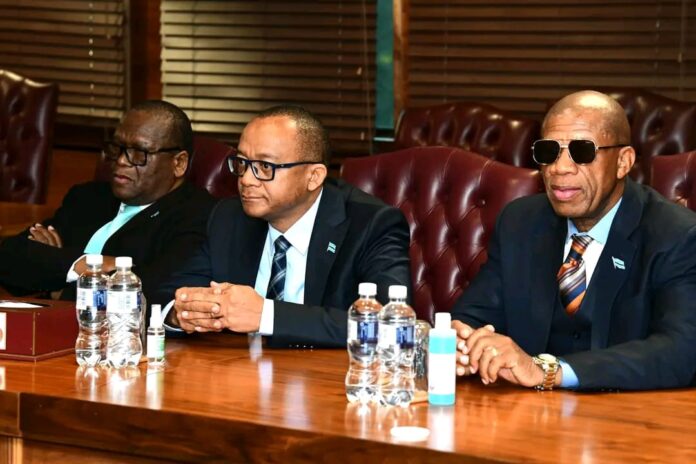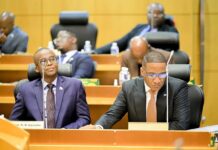The legal landscape of Botswana is set for a significant shift with the recent appointment of three eminent High Court judges to the esteemed Court of Appeal. Justices Lot Moroka, Michael Leburu, and Tshepo Motswagole, each bringing a unique blend of experience, progressive outlook, and a commitment to judicial integrity, are poised to usher in a new era for the nation’s highest appellate court. Their appointments are not merely procedural elevations; they represent a testament to years of dedicated service, groundbreaking judgments, and an unwavering pursuit of justice, promising to shape the future of jurisprudence in Botswana.
Justice Lot Moroka: A Legacy of Reform and Leadership
Justice Moroka is a highly experienced judicial officer, boasting a career spanning 32 years in judicial decision-making, court management, and leadership. His journey began in 1992 as a Magistrate Grade II, and he steadily ascended through the ranks, serving as Magistrate Grade I, Senior Magistrate, Principal Magistrate, Chief Magistrate, and Regional Magistrate.
His career progression includes pivotal roles such as Personal Assistant to the Chief Justice in 2006 and Chief Magistrate in Gaborone in 2007. In 2010, he was appointed to the High Court Judgeship. Since April 2018, he has held the prestigious position of Judge President of the Francistown Division of the High Court of Botswana. As Judge President, he is instrumental in driving the organisational strategic plan and the Chief Justice’s vision for a responsive justice system.
Justice Moroka has made immense contributions to judicial reforms, particularly in improving the conditions of service for magistrates. He played a key role in implementing fundamental administrative advancements, including Judicial Case Management Systems (JCM), Computerised Management System (CRMS), and the establishment of specialised courts such as the Small Claims Court, Traffic Court, and Family Court. He also contributed to the introduction of Motion Courts in Magistrate Courts and the establishment of the Maun Division of the High Court. Throughout his career, he has demonstrated exceptional proficiency in handling complex civil and criminal cases, including those involving corruption and economic crimes. His reputation is built on rendering sound decisions, upholding judicial integrity, and protecting fundamental rights, while also actively engaging in community events and educational initiatives to enhance public perception of the judiciary. His academic background includes a Masters of Laws in Human Rights from the University of Cape Town and a Diploma in Corporate Governance from the University of Johannesburg.
Justice Michael Leburu: A Champion of Progressive Jurisprudence
Justice Leburu’s career trajectory reflects a diverse and impactful legal journey. He began his professional life as a Magistrate before transitioning to serve as General Counsel for several state-owned parastatals, including the Botswana Communications Regulatory Authority, the Motor Vehicle Accident Fund, and the Botswana Development Corporation.In 2010, he was appointed as a Judge of the High Court of the Republic of Botswana. His extensive experience on the bench has seen him preside over a wide array of Civil, Criminal, and Constitutional cases, and he has frequently acted as Chief Justice and Justice of Appeal on various occasions.
A defining moment in Justice Leburu’s judicial career came in 2019 when he authored the landmark judgment that decriminalised same-sex relationships in Botswana. This decision was a significant step forward for human rights in the country. This judgment highlights a judiciary capable of progressive interpretation of the law, actively pushing for human rights and social change even in areas where legislative reform might be slow. The Penal Code Amendment, for instance, has been noted as “still gathering dust” in Parliament despite the Court of Appeal upholding the decriminalisation ruling.This positions Justice Leburu as a jurist willing to challenge the status quo and uphold fundamental rights, directly aligning with the broader judicial mandate to protect human rights, democracy, and the rule of law. His elevation to the Court of Appeal could therefore signal a continued commitment to human rights-based governance at the highest appellate level, potentially influencing future judgments on social issues and reinforcing Botswana’s image as a progressive nation within the region.
Justice Tshepo Motswagole: A Voice for Judicial Accountability
Justice Motswagole brings a diverse legal background to the bench. His career began as a magistrate after completing his LLB at the University of Botswana. He then ventured into private practice and even served in opposition politics as Gaborone Deputy Mayor. Following this, he returned to civil service as Deputy Government Attorney, further enhancing his legal expertise with an LLM from the University of Witwatersrand. He was appointed as a High Court Judge in 2010.
Justice Motswagole is particularly notable for his direct challenge to the judicial appointment system. In 2022, he initiated a highly public and unusual lawsuit against President Mokgweetsi Masisi, then Chief Justice Terrence Rannowane, and Court of Appeal Justice Tebogo Tau. His suit cited an “unfair system” for selecting judges to sit for appeal cases. He accused the Judge President of inviting only certain High Court judges to sit on the CoA, effectively excluding others without a fair and objective process. He further alleged that this practice was formalised into a rule, violating Section 9 of the Court of Appeal Act. His demands included the adoption of a “revolving roster” based on seniority, availability, and equality of opportunity for all High Court judges, as well as a requirement for the judiciary to advertise CoA positions and establish transparent eligibility and selection criteria.
Justice Motswagole’s lawsuit was not merely a personal grievance; it represents a direct challenge to the perceived lack of transparency and meritocracy at the highest levels of judicial appointments. By taking legal action against the President and Chief Justice, he has effectively forced a public debate on critical issues of judicial independence and fairness that have been a source of “longstanding tensions” within the judiciary. His demands for a “revolving roster” and advertised positions directly address the systemic issues previously identified, potentially serving as a pivotal moment for institutional reform. His potential elevation to the CoA, despite or perhaps because of this lawsuit, could signify a shift towards greater accountability within the judiciary itself. It could either be interpreted as a gesture of reconciliation and a commitment to reform, or it could highlight the ongoing internal struggles if his demands for systemic change are not fully met. This also raises the question of whether his activism will continue to shape the CoA’s approach to governance issues.
Beyond his advocacy for judicial reform, Justice Motswagole has delivered notable judgments. In 2013, he issued a landmark High Court ruling that declared Section 203 of the Penal Code, which mandates the death penalty, unconstitutional. His reasoning was that the section failed to afford equal treatment and opportunity to persons convicted of murder. This ruling, though later appealed by the government, underscored his commitment to fundamental rights and fair process.
The elevation of Justices Moroka, Leburu, and Motswagole to the Court of Appeal signals a dynamic new chapter for Botswana’s judiciary. Their combined strengths—Justice Moroka’s administrative prowess and reformist zeal, Justice Leburu’s courageous progressive jurisprudence, and Justice Motswagole’s unwavering commitment to accountability and fundamental rights—promise to enrich the appellate bench. As they embark on this critical new phase of their careers, their collective impact is expected to reinforce the rule of law, champion human rights, and ensure the continued evolution of a justice system responsive to the needs of all Batswana, solidifying Botswana’s reputation as a beacon of democratic governance and judicial independence in the region.



